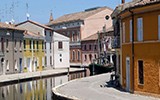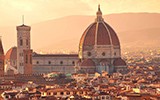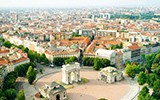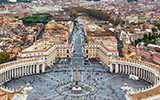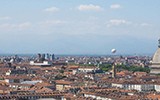It is sometimes difficult to find useful addresses for a destination on a single website. Here are the ones that will guide you ...
Living in Italy guide for expats
All the information you need to relocate and live in Italy.
Our selection of articles for expatriation in Italy
In most European countries, internships play an essential role in shaping education and giving young people valuable work ...
Unless you have decided to move to Italy for retirement or study, you are probably looking for a job to support yourself. This ...
Now that you live in Italy, you probably need to stay in touch with your family, friends and the world around you. Nowadays, you ...
If you have decided to take advantage of your stay in Italy to take your driving test, this article gives you the necessary ...
Living in Italy also means benefiting from a multitude of leisure activities. Between museums, art cities, archaeological areas ...
Family, art, food, wine, fashion, etc., are just some of the things that describe the Italian way of life. Here is a complete ...
Like many industrial cities in northern Italy, Turin has weathered the effects of the global economic crisis. Employees in the ...
Located in the Western Alps, overlooked by snow-capped peaks and surrounded by the River Po, Turin offers expatriates an ...
When moving to Rome, it is natural to visit the city and do various activities in your free time. Of course, there are parks ...
Expats in Rome who like sports will find many activities in the capital, both indoor and outdoor. Running, walking, gym and ...
Rome, the "Eternal City", is an open-air museum, a whirlpool of antiquity and modernity, a place of conviviality and ...
There are several ways to get to your workplace in the Italian capital, depending on where you work and live. Cars and scooters ...
Rome is a trendy city for expatriates, with most looking to move there permanently and build a career. As the Eternal City is not ...
Working in Rome is an opportunity for many expatriates. Still, before starting this new adventure, it is useful to know the ...
About Italy
Italy is home to a large expatriate community, particularly in major cities such as Milan, Turin and Rome, as well as in historical tourist destinations such as Florence. As Italy is also a founding member of the EU, citizens of all other EU Member States have the right to live and work here.
Italy's regions
Italy is made up of 20 regions: Abruzzo, Valle d'Aosta, Puglia, Basilicata, Calabria, Campania, Emilia-Romagna, Friuli-Venezia Giulia, Lazio, Liguria, Lombardy, Marche, Molise, Piedmont, Sardinia, Sicily, Tuscany, Trentino-Alto Adige/Südtirol, Umbria and Veneto. Each of these regions is divided into provinces, 110 in total. Of the 20 regions, five have an autonomous status, allowing them to legislate locally. These are:
- Sicily
- Sardinia
- Trentino-Alto Adige/SüdTirol
- Friuli-Venezia Giulia
- Valle d'Aosta
Climate in Italy
Italy is divided into two climatic parts: in the north, continental Italy, with hot summers and cold winters; in the center and south, Mediterranean Italy, with higher and more constant temperatures thanks to the presence of the sea. Italy is surrounded by the sea and has several thousand kilometers of coastline (7,500 km). It also has mountain ranges in the north with the Alps and in the center with the Apennines.
Snow is more common in the north at the foot of the mountains. In the south, summer temperatures can reach 45°C.
Economy of Italy
Italy suffered severe damage during the global financial crisis and following the Covid-19 pandemic. It lost almost 9% in 2020, but its GDP rebounded by about 5.8% in 2021 to reach about 2 billion euros in 2022. The GDP per capita is about €35,000 (IMF - World Economic Outlook Database).
Italy is the largest European producer of rice, fruit, vegetables and wine. The primary sector represents 2% of GDP. The secondary sector accounts for 21.6% of GDP, with the majority of industries located in the north of the country. Finally, the service sector contributes the majority of Italy's GDP, with 66.7%, and employs 70% of the country's workforce.
Indeed, the northern regions of the country, such as Lombardy, Piedmont and Emilia-Romagna, have diverse sectors of activity, services and industry, while the south is essentially agricultural, although it is increasingly dependent on the tourist industry, particularly in cities such as Rome or in regions such as Puglia, Sicily or Campania with the Amalfi coast near Naples.
Rome is the capital of Italy and also the country's largest city. Milan is Italy's economic capital and financial powerhouse and is also a city that is growing in modernity and dynamism.
Cost of living in Italy
Expatriates should bear in mind that the cost of living in Italy varies from region to region and tends to be higher in the north, where salaries are also higher, particularly in Milan, the country's economic capital. Rome, on the other hand, is less expensive, but wages are also lower.
Languages spoken in Italy
Italian is the main language in Italy, although German is spoken in the northeastern part of the country, near the Austrian border. You will also hear some French in the northwest, Valle d'Aosta and Piedmont regions. In the larger cities, the population has a good command of the English language, unlike the smaller towns. Each region of Italy also has its own dialect, some of which have been recognized as official languages, such as Sardinian or Neapolitan.
Getting to and around Italy
You can reach Italy by land, sea and air. In the north of the country, there is a well-developed road infrastructure, making towns and streets easily accessible, while in the south, it is less so, although still developing. The rail network extends some 15,000 kilometers across the country. To reach the islands, such as Sicily, Sardinia, and other smaller ones, there is a well-developed ferry system. In addition, on the northern lakes such as Lake Maggiore, Lake Como and Lake Garda, it is also possible to travel by boat.
The country also has a wide network of airports in the major cities, the most important being Malpensa and Linate in Milan, Fiumicino and Ciampino in Rome. These are served by daily and frequent flights from all over the world.
Useful links:
Latest housing offers in Italy
Latest job offers in Italy

